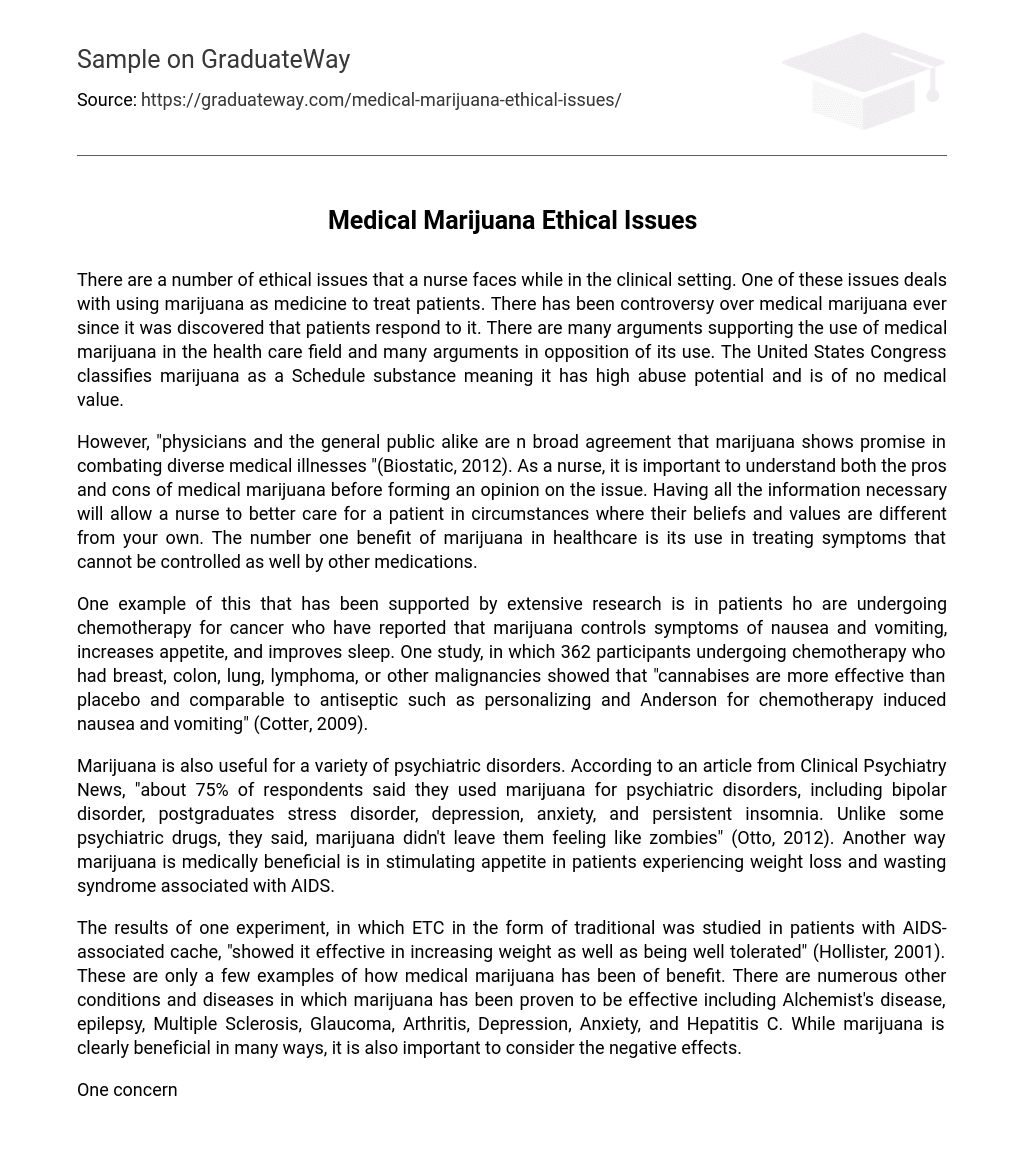When working in the clinical setting, nurses frequently encounter various ethical dilemmas. One such dilemma is the use of marijuana as a medicinal treatment for patients. The controversy surrounding medical marijuana stems from its proven efficacy in patient response. In the healthcare industry, there are both advocates and critics of its usage. As per the classification by the United States Congress, marijuana is categorized as a Schedule substance due to its high potential for abuse and lack of medical benefits.
Both doctors and the general population recognize that marijuana has potential for treating various medical conditions (Biostatic, 2012). It is important for nurses to understand the pros and cons of medical marijuana before forming an opinion. Gathering all the necessary information will help nurses provide better care for patients, especially when their beliefs differ from your own. The main advantage of using marijuana in healthcare is its effectiveness in managing symptoms that cannot be sufficiently controlled by other medications.
Research has extensively demonstrated that marijuana is a beneficial solution for relieving symptoms of nausea and vomiting, improving appetite, and enhancing sleep quality among cancer patients undergoing chemotherapy. A study encompassing 362 participants diagnosed with different types of cancer and receiving chemotherapy treatment revealed that marijuana surpasses a placebo in effectiveness and equals antiseptic medications like personalizing and Anderson in managing chemotherapy-induced nausea and vomiting (Cotter, 2009).
According to a Clinical Psychiatry News article, marijuana has proven to be advantageous in various psychiatric disorders. Around 75% of individuals stated that they utilize marijuana for bipolar disorder, postgraduate stress disorder, depression, anxiety, and persistent insomnia. They observed that unlike specific psychiatric medications, marijuana does not induce a zombie-like state (Otto, 2012). Moreover, marijuana can also assist in increasing appetite among patients suffering from weight loss and wasting syndrome due to AIDS.
The research conducted on patients with AIDS-associated cachexia demonstrated that traditional ETC effectively resulted in weight gain and was well tolerated (Hollister, 2001). Medical marijuana has been scientifically proven to offer benefits for a range of conditions and diseases including Alchemist’s disease, epilepsy, Multiple Sclerosis, Glaucoma, Arthritis, Depression, Anxiety, and Hepatitis C. However, it is essential to acknowledge the possible negative consequences associated with marijuana usage.
According to Canadian Nurse, smoking marijuana has a negative impact on lung health due to its higher tar and toxin content compared to tobacco smoke. Research suggests that smoking one joint is equivalent to consuming two and a half cigarettes in terms of detrimental effects on the lungs (Helpers, 2010). The long-term use of marijuana through smoking is associated with bronchitis and emphysema. While oral cannabis medications can be used as an alternative to minimize lung-related problems, it should be acknowledged that these forms may still cause undesirable side effects like dizziness, sedation, and intoxication.
Both medical and nontransparent users have concerns about the potential addiction to marijuana. This concern has an impact on a nurse’s professional performance, creating an ethical dilemma surrounding medical marijuana. For example, if a patient tells a nurse that they rely on marijuana as their sole effective treatment for managing symptoms, but the nurse becomes aware that the patient is obtaining it illegally, it raises the question of whether the nurse should support ongoing usage or advocate for alternative treatments.
When a nurse fails to report a patient, they must take into account the potential legal ramifications and the risk of breaking the law. Some organizations permit nurses to decline assistance if it conflicts with their religious or moral beliefs, but only when the patient’s safety is not at immediate risk. The issue of marijuana use remains contentious; however, eighteen US states and Washington, DC have enacted laws to legalize medical marijuana.





